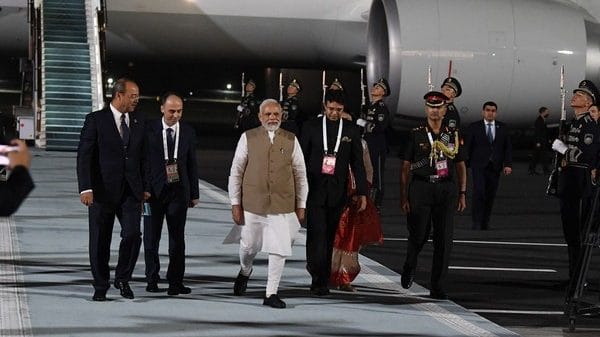Prime Minister Narendra Modi’s first post-Covid in-person attendance at the 22nd summit of the Shanghai Cooperation Organisation summit in Samarkand, Uzbekistan is coming at a time when the region is in the grip of economic and geopolitical upheavals.
The China-sponsored SCO with Russia and four Central Asian countries as members began as a regional grouping. India and Pakistan joined in 2017 and Iran in 2021 with Belarus all set to be inducted as a full member.
Interestingly, the Secretary General of the SCO, Zhang Ming, a seasoned Chinese diplomat, has already set the tone and tenor of the group’s agenda; a forum that aspires to emerge as a “non-aligned” group to counter NATO, which China and Russia blame for the Ukraine crisis. So far, there are no attempts to conceal the group’s ‘anti-West’ mindset. India will chair the group next year and is likely to hold a summit at Varanasi — PM Modi’s Lok Sabha constituency in Uttar Pradesh — to highlight the venue as SCO’s first “Cultural and Tourism Capital”. Notwithstanding India’s interest and contribution to the SCO, Secretary General Zhang has elevated SCO to the status of a global organisation and is not interested in creating “small circles” like the US-initiated Quad of which India is an important member.
India’s objectives behind joining the SCO was primarily to increase its share in regional trade, counterbalance cross-border terrorism laced with religious extremism, safeguarding its interests in Afghanistan, improve connectivity through Iran and Central Asia, and manage relations with China. None of these objectives have seemingly been achieved so far.
As far as terrorism emanating from Pakistan is concerned, it is doubtful if China (or even Russia for that matter) would allow this subject to be raised at the SCO summit, especially in the wake of Beijing’s heavy investments in the highly strategic China-Pakistan Economic Corridor (CPEC) that runs through Pakistan-occupied Kashmir (PoK). India’s engagement with Iran and development of the Chabahar port is not because of SCO but despite stiff competition from China. Again, as far as India-China border issues are concerned, the subject is bilateral and nothing to do with the overall agenda of the SCO. Lastly, New Delhi’s wish to establish trade links with Central Asia is not going to be easily fulfilled nor a combined multilateral effort facilitated by the SCO mechanism.
Also read: Putin, Xi vow to work as ‘great powers’ to thwart West’s attempt to create a ‘unipolar world’
The importance of Central Asia
The strategic locational importance of Central Asia can be overlooked only at a great geopolitical loss to our regional energy and security strategy. From the pre-British period to colonial times, Central Asia played an important role in determining the geopolitical course of events. But the region continued to be driven and controlled by stronger powers like Britain and the Soviet Russia (then USSR) first and later the US. After 9/11 terror attack, the US turned its attention on Central Asia to enlist as partners in its war on terror. But in the last two decades, it is China which has turned towards Central Asia with much greater interest and to tap its natural resources.
Central Asia, like large parts of Africa, is sitting over large deposits of rich mineral wealth and rare earth elements, which are essential for manufacture of processors, electronic parts used in defence, aerospace industry, medical appliances, nuclear plants and clean energy applications equally.
According to a US Geological Survey report, these former Soviet Union territories are endowed with as many as 17 rich rare earth elements and rare metals. Central Asia has ample deposits of other resources also, such as 38.6% of global manganese ore reserves, 30.07% of chromium, 20% of lead, etc. according to a 2021 research study. And all these materials are used in a wide range of clean energy technologies.
The ‘Connect Central Asia Policy’, unveiled in 2012, was revived by PM Modi in 2015 when he visited all five Central Asian countries—Uzbekistan, Kazakhstan, Turkmenistan, Kyrgyzstan and Tajikistan. Greater soft-power economic diplomacy needs to be practiced and a gateway to Central Asia—on the lines of the historic land routes that existed before the tragic Partition—has to be created. But it is difficult to imagine the SCO facilitating the creation of such a seamless land route between India and Central Asia.
Russia’s neo-Eurasianist policy impacting the energy security of Europe and the West, and China’s economic expansionism are at the root of New Delhi’s continued engagement with the SCO keeping the fundamental principles of democracy, multilateralism and strategic autonomy as cornerstones of its foreign policy. The Modi government’s foreign policy has been recalibrated to address the needs of the changing geopolitical dynamics. The foreign policy establishment at the South Block has successfully mastered the art of balancing between the Quad and the SCO, between ‘sanctioned’ countries and democracies, between the neo-Socialist bloc and the free-market economies, and between the liberal and autocratic hegemonies.
The author is the former editor of ‘Organiser’. He tweets @seshadrichari. Views are personal.
(Edited by Prashant)






